If Charlotte, South Carolina, is the beating heart of the South, New Orleans is its soul. There’s the Deep South, and then there is New Orleans.
Although the Big Easy may lack the ambiance and raucous noise of New York City, it has its own resonance.
From the fog-shrouded mangroves and pendulous Spanish Moss to the colorful explosion of Bourbon Street, New Orleans is steeped in culture, vibrancy, and history distinct from anywhere else in America.
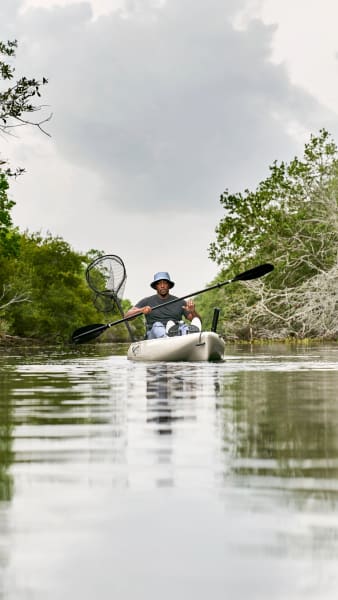
I wasn’t entirely surprised to discover that Anthony Mackie was born and raised in New Orleans. He has that vibe that only comes from those who grew up between Pascagoula and Lafayette.
Related: Nine Mysteries We Should Have Been Able To Solve
Nor was I surprised that sharks (mostly bull sharks) often make their way up the mighty Mississippi. Anglers catch sharks well North of the Gulf of Mexico all the time, including in Lake Pontchartrain.
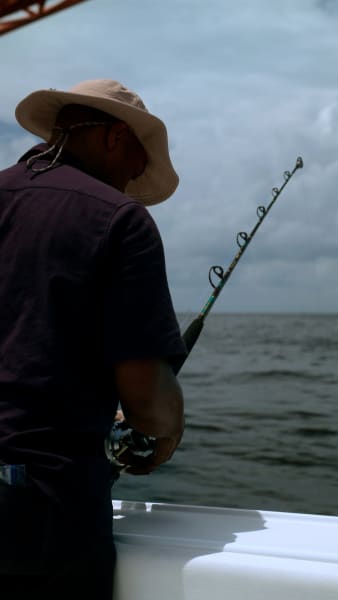
But Anthony Mackie wasn’t returning home to study this well-known phenomenon. Lately, sharks have targeted charter boat hauls and fish on the end of a line — strange behavior from predators perpetually surrounded by prey.
It’s an interesting dynamic that threatens the fishing industry in the South.
Homecoming with a Purpose
“Returning home” is actually a misnomer. Anthony Mackie owns a home and is currently raising a family in New Orleans. But, when you live the life of a movie star, home is often a place where you spend the least amount of time throughout the year.
He recently purchased 20 acres in New Orleans, and it’s no surprise that he wants his legacy, or at least a major part of it, to remain in the Big Easy. New Orleans is a beautiful place, but like most beautiful places, it comes with some caveats.
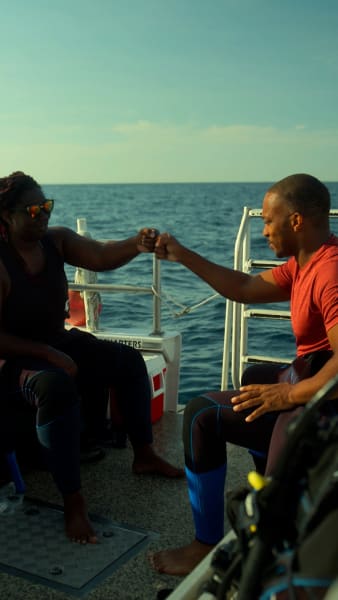
Over 60% of the city sits below sea level, making it distinctly vulnerable to hurricanes and major storms rolling in from the Gulf. And, of course, there are plenty of sharks in the Gulf of Mexico.
That’s where Shark Beach comes in. Anthony made the most sense when National Geographic put together the idea behind this intriguing documentary.
Related: Nine Monumental TV Episodes That Changed TV Forever
He is a well-known MCU star and intimately familiar with his old stomping grounds. Since Disney owns National Geographic, Mackie makes sense on every level.
Better yet, he’s a certified diver with extensive experience, not just with diving but also with sharks.
Mackie didn’t just sign up to learn the whys and hows of sharks stealing fish off the line and tearing into charter boat nets. He’s also there to draw attention to New Orleans’s disappearing wetlands, an area of concern for some time now.
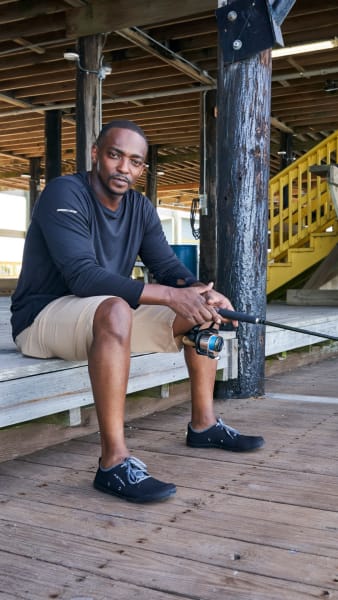
Impact on the Southern Fishing Industry
Shark Beach doesn’t take long to dive into the heart of the matter (pun intended). Sharks are swarming charter boats, tearing open the nets, and eating fish right off the line before unlucky anglers can reel in their haul.
It’s not just a unique and local behavior, either. Mackie travels as far as the coast of Juniper, Florida, to analyze this growing fish thievery.
According to the National Fisherman, sharks are learning to associate the sounds of boat engines with food. Sounds pretty obvious when you think about it. Sharks are far from dumb, after all.
Throughout Shark Beach, Mackie uses the term “depredation” a lot, and it’s a fitting word; it means damage or destruction, and the anglers along the Gulf Coast have experienced a significant rise in depredation over the last ten years or so.
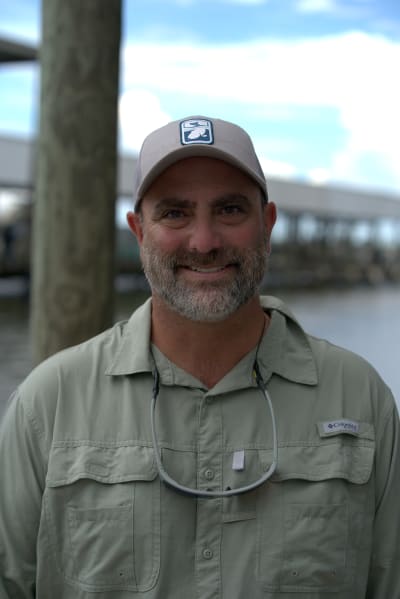
Mackie frames the problem perfectly. How do we reduce depredation without destroying the sharks? Shark populations are rising, as are the number of anglers, so it was only a matter of time before things reached a breaking point.
For now, anglers are heading farther offshore to protect their hauls and avoid a sudden shiver (large gathering of sharks) descending on their catch.
Related: The Sopranos Documentary Raises the Question:
Was the HBO Mob Drama the Most Influential Series of All Time?
A New Angle On Shark Behavior
Mackie and a crew of marine biologists explore underwater wreck sites off the coast of West Palm Beach, Florida.
These shipwrecks attract a massive host of marine life as artificial reefs, making them a hot spot for anglers. Huge improvements in recreational sonar technology create an environment where anglers can easily locate and fish these wreck sites.
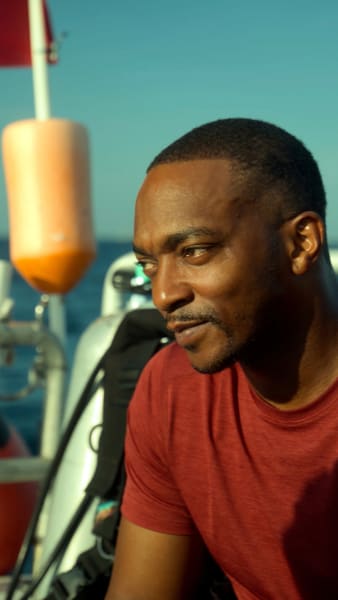
As apex predators, sharks do exactly what their dry land counterparts do — go wherever the prey is.
The only difference is boat engines are rapidly becoming the new dinner bell, a bell sharks respond to from miles out.
The crew uses ultrasonic receivers to trace shark movements along underwater reefs, attempting to determine where sharks prefer to gather along these reefs and why.
Mackie isn’t the most enthusiastic helper in capturing and physically handling bull sharks, but I can’t blame him. Bull sharks are among the top five sharks responsible for the most unprovoked attacks on people.
We also learned a few interesting facts, such as the hypnotic state sharks enter when flipped upside down and the process for studying shark feeding habits. The latter of which Mackie participates in, much to his chagrin.

Ultimately, the goal is to build new artificial reefs that don’t attract sharks, resulting in reefs for anglers and reefs for sharks.
The Louisiana Coastline
New Orleans is Mackie’s hometown, and Hurricane Katrina and the future of the Louisiana coastline are important factors for sharks and the residents of New Orleans in particular.
Related: 13 Pro Athletes Who Found Great Success as Actors
Hurricane Katrina, especially the resulting flooding, left an indelible mark on the area.
For centuries, the wetlands of the coastline served as a natural buffer between New Orleans and storm surges. After all, New Orleans isn’t uniquely positioned to resist massive storms.
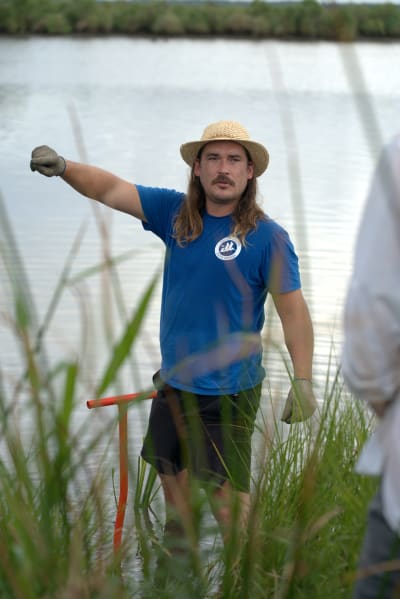
That’s what the levees were for, which Hurricane Katrina went through like an arrow through wet paper. Unfortunately, erosion is slowly destroying this buffer and removing the natural habitat and protective mechanism for bull sharks.
The latter portion of Shark Beach intensely focuses on this, along with studies on the rapidly devolving bull shark habitat and restoration efforts.
As the buffer vanishes, bull sharks move farther inward, increasing the number of depredation events. Shark Beach and Mackie tie a neat bow around the depredation problem, both offshore and inshore.
A Fantastic Kick-Off for National Geographic’s SharkFest Line Up
It’s becoming increasingly difficult to hold people’s attention these days, especially regarding issues such as erosion, depredation, historic flooding, and the scientific analysis of shark behavior.

National Geographic is well aware of this. Bringing in Anthony Mackie is a step in the right direction, using his drawing power to facilitate attention around a vital issue.
Mackie was the perfect choice, and Shark Beach elevates his voice while telling the story of an ongoing problem within the fishing industry along the Gulf Coast.
Related: 21 Amazing Adventure Seekers
In roughly 45 minutes, Shark Beach weaves a fascinating tale of increasing depredation, Mackie’s interesting background and history, bull sharks moving into freshwater areas, and coastal erosion problems.
New Orleans is a historic gem, not only of the south but of the entire country. So much has happened in the Big Easy over the centuries. It rarely gets the attention that cities like New York City, Los Angeles, and Chicago get.
Shark Beach is an effective attractant, drawing attention to the important issues and giving Mackie a chance to do more than represent a superhero on theater screens.
Edit Delete
Thomas Godwin is a staff writer for TV Fanatic. You can follow him on X



.png)



